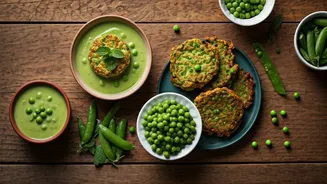Unlock a Healthier You: Secrets of Balanced Diet & 7 Essential Nutrients. Dive in for a vibrant life!
In the hustle-bustle of our daily lives, it's easy to grab a quick snack instead of focusing on what
our body truly needs. But what if I told you that unlocking a healthier, more energetic you could be as simple as understanding the key ingredients in a balanced diet?
Forget complicated diet fads; let's dive into the world of essential nutrients, the building blocks for a thriving life. This isn't about restrictions, but about empowerment – arming yourself with the knowledge to make informed choices about what you eat.
After all, food is fuel, and the right fuel can make all the difference.
The Power of Protein: Building Blocks for Life
Protein is often hailed as the king or queen of nutrients, and for good reason! It's the essential building block for pretty much everything in our bodies: muscles, skin, hair, and even our immune system. Think of protein as the bricks and mortar of your internal construction crew.
When you don't get enough, your body struggles to repair tissues, build new ones, and fight off infections. This is specially important for growing kids.
To meet your daily protein needs, you can eat items such as lentils (daal), chickpeas (chana), kidney beans (rajma), soya chunks, cottage cheese (paneer), and curd (dahi). These superfoods are not only packed with protein; they also provide essential vitamins and minerals.
Protein also helps you feel full for longer, which can be a major advantage if you're trying to manage your weight or simply avoid those mid-afternoon energy crashes. It slows down the digestion procedure.
This controlled method makes sure that you get constant energy through the day avoiding spikes and crashes. Integrating protein in every serving of food, whether its a snack or the main meal can prove to be beneficial.
For instance, add some nuts to your daily servings of fruits or include a bowl of healthy sprouts to your breakfast.
This way you can easily integrate protein into your diet without really trying. Not consuming the required protein can lead to fatigue, weakening of muscles, and poor immunity.
Adding protein to the daily diet is easy when you choose nutritious and accessible food that easily fit into your dietary preferences. Hence, consuming protein is similar to empowering your body so it can perform to its optima and keep you healthy and active.
Carbohydrates: The Body's Energy Source
Carbohydrates often get a bad rap, but they're actually the body's preferred source of energy. Think of them as the fuel that powers your engine. There are two main types: simple and complex.
Simple carbohydrates, like those found in sugary drinks and processed foods, provide a quick burst of energy followed by a crash. Complex carbohydrates, on the other hand, are digested slowly, providing a sustained release of energy. These are found in whole grains, fruits, and vegetables.
Focus on choosing complex carbohydrates whenever possible. Whole wheat products such as roti and pasta are healthier as compared to the processed white flour food. Brown rice is a great option as compared to white rice.
Including vegetables like sweet potato and fruits which are naturally sweet can give the body the required energy. Complex carbs are rich in fiber, which helps in digestion and keeps blood sugar levels balanced, which is extremely helpful.
It also helps to prevent chronic conditions and aids in maintaining a healthy weight.
So, when you feel tired, your body might be wanting some good carbohydrates to help it function. Instead of going for sugary items, pick items such as a roti with vegetables or a bowl of poha.
Carbs are the basic necessity for the body's energy needs. Choose your carbs wisely to manage energy levels and maintain health. This also depends on how active you are and your body will need more carbohydrates to keep its energy supply.
The Good Fats: Healthy and Happy Heart
Yes, fats can be good for you! The key is to choose the right kinds. Unsaturated fats, found in nuts, seeds, and avocados, are beneficial for heart health. They help lower bad cholesterol levels and reduce the risk of heart disease. Avoid saturated and trans fats, which are found in processed foods.
These can raise bad cholesterol levels and increase the risk of heart problems. These fats only do harm to the body. Including healthy fats in our diet is important because these help the body to absorb important vitamins, provide energy and support a healthy cell growth.
Nuts like almonds and walnuts, and seeds like flaxseeds and chia seeds are excellent sources of unsaturated fats. You can add them to your snacks, salads, or even your breakfast cereal. For meals use cooking oils like olive oil or groundnut oil in moderation to enjoy their heart healthy benefits.
A healthy heart needs the assistance from good fats and it is important to take these types of fats as part of your regular diet. Eating fats in moderate portions can improve your heart health and overall well being, which helps you feel great and energetic.
Make sure you are always choosing the right fats to keep your heart healthy and free from any illness. A good heart is a healthy body and mind, so taking care of the nutrients that are needed by the body can make a great impact.
Choosing the correct healthy fats is the best decision you can make and keep your heart healthy.
Vitamins: The Essential Helpers
Vitamins are like tiny superheroes that help your body carry out essential functions. From boosting your immune system and keeping your skin healthy to supporting nerve function, vitamins play a crucial role in maintaining overall health.
A, C, D, E, and the B vitamins (B1, B2, B3, B5, B6, B7, B9, and B12) are some of the most important ones. You can get these vitamins from a wide range of foods, especially fruits and vegetables.
Vitamins A,D, E, and K are fat soluble, so they are best absorbed when eaten with food that has fat contents. They are stored in the body for a longer time and help in maintaining good vision, healthy bones, and protecting cells from damage.
Water soluble vitamins such as Vitamin C and B don't stay in the body for long because the body does not store them. These vitamins are important for energy production, formation of red blood cells, and keeping the immune system strong.
So, one must consume these on a regular basis for overall well being.
A colourful plate is a vitamin rich diet which helps the body to function at its best. A well balanced diet ensures receiving the necessary vitamins for health. So eat those vegetables and fruits in order to feel your best.
Minerals: The Body's Spark Plugs
Minerals, like vitamins, are essential for many bodily functions. They help build strong bones, regulate blood pressure, and support nerve and muscle function. Some key minerals include calcium, iron, potassium, and zinc.
Calcium is important for bone health (eat dairy products and leafy greens), iron for carrying oxygen in the blood (eat leafy greens and dry fruits), potassium for regulating blood pressure ( eat bananas and sweet potatoes), and zinc for immune function.
Iron helps in preventing anemia, and potassium assists in keeping blood pressure under control. These minerals when combined together keep the functions of the body balanced. These are extremely important for growth, good health, and general well being.
It is easy to incorporate minerals into your everyday meals and this is a great way of getting all the minerals you need.
It is important to include variety in your meals to make sure you are eating all the vitamins and minerals necessary.
The secret to a healthy life is in the balanced supply of all important nutrients the body needs. Your health depends on these minerals.
Fiber: The Digestive System's Friend
Fiber is a type of carbohydrate that the body cannot digest. Instead, it passes through your digestive system, promoting healthy bowel movements and preventing constipation.
More than that, fiber helps regulate blood sugar levels, lower cholesterol, and even promote weight loss by helping you feel full longer. So, why not add fiber filled ingredients in your diet?
You can find fiber in whole grains, fruits, vegetables, and legumes.
Aim for at least 25-30 grams of fiber per day. Adding items like whole wheat roti, oats, and fibrous snacks can help in digestion and also improves metabolism. Vegetables and fruits with their skins on, contain a lot of fibre.
All of these ingredients together aid proper digestion and enhance all round health.
Fiber is a silent hero that keeps digestive system at its peak. Including sufficient amounts of fiber helps manage weight and keep the digestive system healthy.
High fiber foods are important additions in your diet as they ensure good health.
Water: The Elixir of Life
It may seem obvious, but water is often overlooked as an essential nutrient. Water makes up about 60% of your body weight and is involved in countless bodily functions, including transporting nutrients, regulating body temperature, and flushing out toxins.

Most adult need to drink about 2-3 litres of water a day, more if you are active.
Drinking water can help with focus, energy, and even keep you looking great. Add water rich food like watermelons and cucumber if you can't bear the taste of plain water.
Staying hydrated makes sure that all other nutrients are processed by the body with ease.
Ensure you hydrate your body as that is the most important way to make sure you function effectively and that the nutrients that you have consumed are being absorbed into your blood stream.
Water makes sure the other nutrients are properly distributed. Drinking the right amount of water helps you feel great and keeps diseases at bay.
By understanding these seven essential nutrients and making conscious choices about what you eat, you're well on your way to unlocking a healthier, more vibrant you. Remember, it's not about perfection, but about progress. Small, sustainable changes can lead to big results.
So, start today, and nourish your body from the inside out!
AI Generated Content. Glance/InMobi shall have no liability for the content










